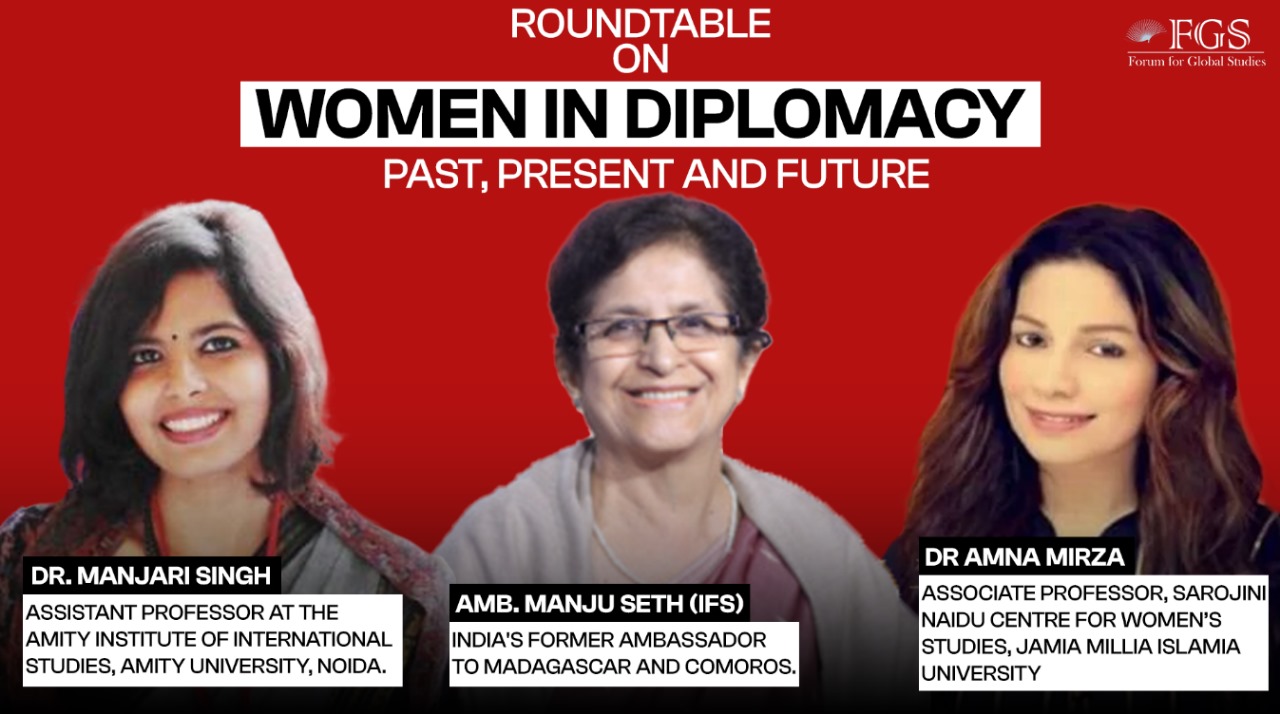The podcast episode titled “FGS Round Table on Women in Diplomacy: Past, Present and Future. Amb. Manju Seth on Women Diplomacy.” was hosted by Forum For Global Studies, a Delhi based multidisciplinary thinktank. Dr Sandeep Tripathi moderated the session and the talk featured distinguished Panelists Amb. Manju Seth (IFS), India’s former Ambassador to Madagascar and Comoros, Dr. Manjari Singh, Assistant Professor, Amity University, Dr Amna Mirza, Associate Professor, Jamia Millia Islamia University. The discussion focused on the role of women in Diplomacy.
Dr Tripathi began the discussion by introducing Amb. Manju Seth, Dr. Manjari Singh and Dr Amna Mirza by welcoming them for the round table conference. Amb. Manju Seth opened the discussion by stating the worldwide acknowledgement of 24th June as International Day Of Women In Diplomacy. She highlights the concerns around in visibilization on silencing of women in the diplomatic sphere with the limited opportunities for women in comparison to men. Amb Manju Seth also mentioned Mrs Muthamma, first Indian woman to join foreign services in 1949 talking about the gradual yet impactful changeIndia is witnessing in terms of women participation in diplomacy. However, Amb Sanju Seth raised her concern over larger participation of women in foreign services not implying larger share in policy formulation. She emphasized the importance of women in diplomacy, bringing a new outlook and perspective to the working. Later, Ambassador Manju Seth discussed the increasing ambiguity surrounding Feminist Foreign Policy, highlighting the vagueness in its definition and approach and rooting for an inclusive foreign policy instead. She discussed the subordination of women compared to their male counterparts in foreign services, highlighting the transformation happening in the diplomatic sphere with more prospects being provided to women, stating the example of Amb Ruchira Kamboj, Indian Ambassador to the USA. She concluded her remarks by discussing the lower preference for foreign service among most candidates, regardless of gender. Dr Tripathi expressed his thoughts over the need for right narratives about feminism and women centric foreign policy to harness a better foreign policy.
Later Dr Amna Mirza carried ahead the conversation by greeting Amb. Manju Seth (IFS), Dr. Manjari Singh and Dr. Tripathi. Dr. Amna Mirza expanded on her thoughts by quoting Cristina Elisabet Fernández de Kirchner, an Argentinian lawyer and politician who served as president of Argentina from 2007 to 2015 and later as vice president. Kirchner emphasized that our society needs more women in decision-making and entrepreneurship areas, noting that women always have to pass a two-fold test. She further eluded upon the biased assumptions hindering the opportunities women receive in the domain of international relations, thereby explaining the biological narrative revolving around international relations being about valor and masculinity. She discussed marginalization and inadequate representation of women on the global stage especially in policy making.
Moving ahead Dr. Manjari Singh expressed her thoughts by raising concerns over diplomacy being a male dominated discipline. She supported her stance by stating the nominal percentage of 20.5% women in diplomacy worldwide. Dr Manjari explained the need for ‘recognition’ over ‘representation’ for women in foreign policy endeavors. She talked about gender as a social construct overlooking the potential of women in diplomacy and international politics. She further highlighted the discrimination present in the first international charter that addressed the equality of men and women, the UN Charter. Dr. Manjiri also discussed the changing landscape of world affairs, noting that women are increasingly making it into actual decision-making roles due to their potential. She cited examples of women leaders participating in Track 2 dialogues. Later, Dr. Tripathi concluded the roundtable discussion by offering a vote of thanks to the panelists.

